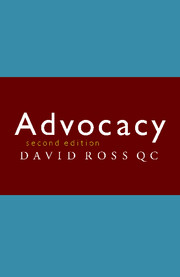Book contents
- Frontmatter
- Contents
- Foreword
- 1 The nature of advocacy
- 2 Preparation
- 3 Witnesses and questions
- 4 Examination-in-chief
- 5 Cross-examination: its qualities
- 6 Cross-examination: method and style
- 7 Cross-examination of experts
- 8 Cross-examination on documents
- 9 Re-examination
- 10 Admissibility, objections and submissions
- 11 The addresses
- 12 Plea in mitigation
- 13 Appeals
- 14 Legal writing
- 15 Etiquette and ethics
- Index
- Frontmatter
- Contents
- Foreword
- 1 The nature of advocacy
- 2 Preparation
- 3 Witnesses and questions
- 4 Examination-in-chief
- 5 Cross-examination: its qualities
- 6 Cross-examination: method and style
- 7 Cross-examination of experts
- 8 Cross-examination on documents
- 9 Re-examination
- 10 Admissibility, objections and submissions
- 11 The addresses
- 12 Plea in mitigation
- 13 Appeals
- 14 Legal writing
- 15 Etiquette and ethics
- Index
Summary
General
[2000] You occasionally hear of an advocate who never prepares a case but can win it in court through sheer brilliance. If such advocates exist outside film and television they are out of my class, and out of the class of every advocate I know.
[2005] It is not easy to put down principles of preparation that can be applied to all cases. Every case is unique and must be custom built. Each has its own special aspects, its own idiosyncrasies. The preparation for every case will be slightly or substantially different from any other.
[2010] The main purposes of preparation are to develop a concept of the case, and to work out what you want to do and how you can do it. You should also be able to put your hand on any given document at a moment's notice. While you are preparing you will assemble all the necessary law: precedential, statutory and evidential. Find all of the procedural rules and practices that apply. All these things will work together. Each is essential.
[2015] Preparation can be fearfully demanding. Most cases are won on your effort between 10 pm and 2 am. It is solitary work.
The court
[2020] At some stage you ought to visit the court in which you expect to appear. Look at the judges and listen to them. Try to analyse the style of each. It should not surprise you that not every judicial officer is the same.
- Type
- Chapter
- Information
- Advocacy , pp. 11 - 22Publisher: Cambridge University PressPrint publication year: 2007



